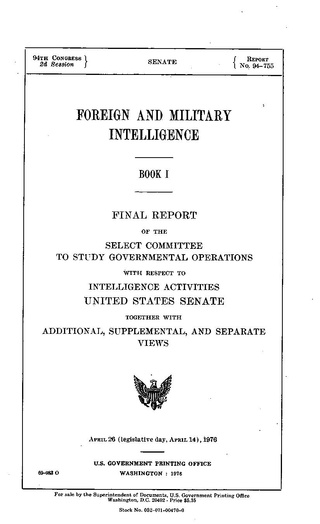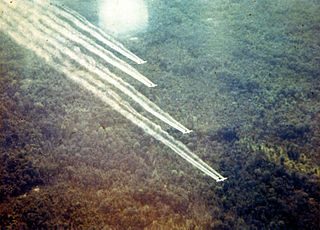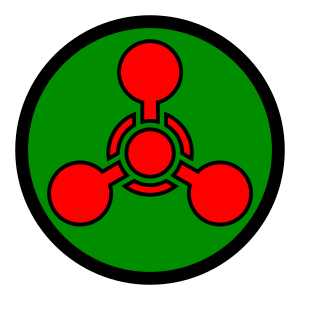
Agent Orange is a chemical herbicide and defoliant, one of the tactical use Rainbow Herbicides. It was used by the U.S. military as part of its herbicidal warfare program, Operation Ranch Hand, during the Vietnam War from 1961 to 1971. The U.S. was strongly influenced by the British who used Agent Orange during the Malayan Emergency. It is a mixture of equal parts of two herbicides, 2,4,5-T and 2,4-D.

Chemical warfare (CW) involves using the toxic properties of chemical substances as weapons. This type of warfare is distinct from nuclear warfare, biological warfare and radiological warfare, which together make up CBRN, the military acronym for chemical, biological, radiological, and nuclear, all of which are considered "weapons of mass destruction" (WMDs), a term that contrasts with conventional weapons.
The Protocol for the Prohibition of the Use in War of Asphyxiating, Poisonous or other Gases, and of Bacteriological Methods of Warfare, usually called the Geneva Protocol, is a treaty prohibiting the use of chemical and biological weapons in international armed conflicts. It was signed at Geneva on 17 June 1925 and entered into force on 8 February 1928. It was registered in League of Nations Treaty Series on 7 September 1929. The Geneva Protocol is a protocol to the Convention for the Supervision of the International Trade in Arms and Ammunition and in Implements of War signed on the same date, and followed the Hague Conventions of 1899 and 1907.

Aberdeen Proving Ground (APG) is a U.S. Army facility located adjacent to Aberdeen, Harford County, Maryland, United States. More than 7,500 civilians and 5,000 military personnel work at APG. There are 11 major commands among the tenant units, including:

The United States is known to have possessed three types of weapons of mass destruction: nuclear, chemical, and biological weapons. As the country that invented nuclear weapons, the U.S. is the only country to have used nuclear weapons on another country, when it detonated two atomic bombs over two Japanese cities of Hiroshima and Nagasaki during World War II. It had secretly developed the earliest form of the atomic weapon during the 1940s under the title "Manhattan Project". The United States pioneered the development of both the nuclear fission and hydrogen bombs. It was the world's first and only nuclear power for four years, from 1945 until 1949, when the Soviet Union produced its own nuclear weapon. The United States has the second-largest number of nuclear weapons in the world, after the Russian Federation.

Gerald Ford's tenure as the 38th president of the United States began on August 9, 1974, upon the resignation of President Richard Nixon, and ended on January 20, 1977. Ford, a Republican from Michigan, had been appointed vice president on December 6, 1973, following the resignation of Spiro Agnew from that office. Ford was the only person to serve as president without being elected to either the presidency or the vice presidency. His presidency ended following his narrow defeat in the 1976 presidential election to Democrat Jimmy Carter, after a period of 895 days in office. His 895 day presidency remains the shortest of all U.S. presidents who did not die in office.

The Church Committee was a US Senate select committee in 1975 that investigated abuses by the Central Intelligence Agency (CIA), National Security Agency (NSA), Federal Bureau of Investigation (FBI), and the Internal Revenue Service (IRS). Chaired by Idaho Senator Frank Church (D-ID), the committee was part of a series of investigations into intelligence abuses in 1975, dubbed the "Year of Intelligence", including its House counterpart, the Pike Committee, and the presidential Rockefeller Commission. The committee's efforts led to the establishment of the permanent US Senate Select Committee on Intelligence.

A stink bomb, sometimes called a stinkpot, is a device designed to create an unpleasant smell. They range in effectiveness from being used as simple pranks to military grade malodorants or riot control chemical agents.

The United States President's Commission on CIA Activities within the United States was ordained by President Gerald Ford in 1975 to investigate the activities of the Central Intelligence Agency and other intelligence agencies within the United States. The Presidential Commission was led by Vice President Nelson Rockefeller, from whom it gained the nickname the Rockefeller Commission.
The Permanent Subcommittee on Investigations (PSI), stood up in March 1941 as the "Truman Committee," is the oldest subcommittee of the United States Senate Committee on Homeland Security and Governmental Affairs. After the September 11, 2001, terrorist attacks in the United States, the Committee broadened its title to Homeland Security and Governmental Affairs Committee. PSI led the Committee's broad mandate to "investigate inefficiency, mismanagement, and corruption in Government."

Herbicidal warfare is the use of substances primarily designed to destroy the plant-based ecosystem of an area. Although herbicidal warfare use chemical substances, its main purpose is to disrupt agricultural food production and/or to destroy plants which provide cover or concealment to the enemy, not to asphyxiate or poison humans and/or destroy human-made structures. Herbicidal warfare has been forbidden by the Environmental Modification Convention since 1978, which bans "any technique for changing the composition or structure of the Earth's biota".

Gerald Rudolph Ford Jr. was an American politician and lawyer who was the 38th president of the United States, serving from 1974 to 1977. A member of the Republican Party, Ford assumed the presidency after the resignation of President Richard Nixon, under whom he had served as the 40th vice president from 1973 to 1974 following Spiro Agnew's resignation. Prior to that, he served as a member of the U.S. House of Representatives from 1949 to 1973.

The Chemical Corps is the branch of the United States Army tasked with defending against and using chemical, biological, radiological, and nuclear (CBRN) weapons. The Chemical Warfare Service was established on 28 June 1918, combining activities that until then had been dispersed among five separate agencies of the United States federal government. It was made a permanent branch of the Regular Army by the National Defense Act of 1920. In 1945, it was redesignated the Chemical Corps.

Joseph Albert Benkert is an American naval officer and diplomat who served as an officer in the United States Navy, and as an appointed official in the George W. Bush Administration. He joined the Cohen Group in 2009 after serving as the Assistant Secretary of Defense for Global Security Affairs. Benkert currently serves on the board of International Relief and Development Inc. In October 2018, He joined Morrison & Foerster as a National Security Advisor.

In the United States, a presidential proclamation is a statement issued by the president of the United States on an issue of public policy. It is a type of presidential directive.
The "Statement on Chemical and Biological Defense Policies and Programs" was a speech delivered on November 25, 1969, by U.S. President Richard Nixon. In the speech, Nixon announced the end of the U.S. offensive biological weapons program and reaffirmed a no-first-use policy for chemical weapons. The statement excluded toxins, herbicides and riot-control agents as they were not chemical and biological weapons, though herbicides and toxins were both later banned. The decision to ban biological weapons was influenced by a number of domestic and international issues.

A chemical weapon (CW) is a specialized munition that uses chemicals formulated to inflict death or harm on humans. According to the Organisation for the Prohibition of Chemical Weapons (OPCW), this can be any chemical compound intended as a weapon "or its precursor that can cause death, injury, temporary incapacitation or sensory irritation through its chemical action. Munitions or other delivery devices designed to deliver chemical weapons, whether filled or unfilled, are also considered weapons themselves."
The following is a timeline of the presidency of Gerald Ford from January 1, 1975, to December 31, 1975.












